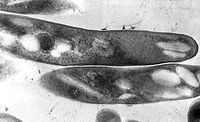
Photo from wikipedia
Intracellular survival of Mycobacterium tuberculosis results in bacterial proliferation and the spread of infection in lungs, consequently deteriorating the conditions of tuberculosis (TB) patients. This research discovers a new immune… Click to show full abstract
Intracellular survival of Mycobacterium tuberculosis results in bacterial proliferation and the spread of infection in lungs, consequently deteriorating the conditions of tuberculosis (TB) patients. This research discovers a new immune escape pathway of M. tuberculosis by modulating host miR-325-3p expression, thus leading to the intracellular survival of M. tuberculosis. These findings make a contribution to the understanding of the immune escape of M. tuberculosis, and they provide a theoretical basis for the development of therapeutic approaches for drug-resistant TB. ABSTRACT Tuberculosis (TB) is an infectious disease caused by Mycobacterium tuberculosis that poses threats to the public. M. tuberculosis survives in macrophages by escaping from immune surveillance and clearance, which exacerbates the bacterial proliferation. However, the molecular mechanisms of this immune escape have not yet been fully understood. Using multiple cell and mouse models, we found that microRNA-325-3p (miR-325-3p) is upregulated after M. tuberculosis infection and Mir325-deficient mice show resistance to M. tuberculosis. We demonstrated that miR-325-3p directly targets LNX1, an E3 ubiquitin ligase of NEK6, and that this hampers the proteasomal degradation of NEK6 in macrophages. The abnormal accumulation of NEK6 leads to the activation of STAT3 signaling, thus inhibiting the process of apoptosis and promoting the intracellular survival of M. tuberculosis. Our findings not only reveal a new immune escape pathway of M. tuberculosis but also may provide new insights into the development of therapeutic approaches for drug-resistant TB. IMPORTANCE Intracellular survival of Mycobacterium tuberculosis results in bacterial proliferation and the spread of infection in lungs, consequently deteriorating the conditions of tuberculosis (TB) patients. This research discovers a new immune escape pathway of M. tuberculosis by modulating host miR-325-3p expression, thus leading to the intracellular survival of M. tuberculosis. These findings make a contribution to the understanding of the immune escape of M. tuberculosis, and they provide a theoretical basis for the development of therapeutic approaches for drug-resistant TB.
Journal Title: mBio
Year Published: 2020
Link to full text (if available)
Share on Social Media: Sign Up to like & get
recommendations!